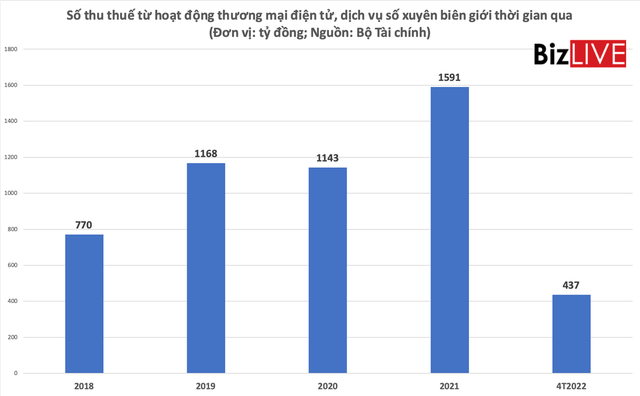Vietnam has collected 4,518 billion dong of tax from Facebook, Google and Microsoft
The Minister of Finance has just sent a report to the National Assembly deputies, specifically mentioning the tax management situation for business activities on digital platforms. This is also the content chosen to question the upcoming financial industry advisor.
According to the report, in the past time, with the development of the digital economy, doing business on the digital platform has become popular. On the basis of information extraction, currently in Vietnam, there are 139 e-commerce trading floor owners, including 41 e-commerce trading floors, 98 service-providing e-commerce floors, and 03 companies partners of foreign suppliers are entitled to pay on behalf of foreign suppliers to organizations and individuals that have transactional relations with foreign suppliers; corresponding to the average number of customers accessing the floors about 3.5 million visitors/day.

To manage taxes on business activities on digital platforms, the Ministry of Finance strengthens management through a number of important solutions.
Regarding the construction and improvement of the legal basis: Amended and supplemented tax regulations on tax administration for e-commerce business in the Law on Tax Administration No. 38/2019/QH14 and other Tax Laws (Price) Value Added Tax, Corporate Income, Personal Income), guiding documents on the implementation of the Tax Law, the Law on Tax Administration, guiding the direction of regulating payment intermediaries and organizations that are partners of If a foreign digital platform provider does not have a fixed business establishment in Vietnam, the organization that is the owner of an e-commerce trading floor is responsible for coordinating with tax authorities in tax administration for e-commerce activities. .
This coordination responsibility is carried out by providing information to state management agencies; declare tax, pay tax on behalf of individuals with business activities on the e-commerce floor with the function of ordering online.
Secondly, the Ministry of Finance has coordinated with relevant ministries, branches, organizations and associations to exchange and connect information. Recently, the Ministry of Finance has signed an agreement, cooperated with the Ministry of Industry and Trade, the Ministry of Information and Communications, built a cooperation agreement with the State Bank of Vietnam, the Ministry of Public Security. Accordingly, ministries and sectors have agreed on principles of coordination in e-commerce management such as sharing databases, providing information, and coordinating in amending legal policies to strengthen e-commerce management in general. and tax administration in particular.
Third, continue to modernize tax administration to support foreign suppliers who do not have a fixed business establishment in Vietnam to fulfill their tax obligations in the electronic form directly at the Portal. of the General Department of Taxation.
In addition, the Ministry of Finance has directed the General Department of Taxation to continue researching and building technical solutions, upgrading information technology infrastructure to connect and store information from e-commerce trading floors and information from other branches. relevant state agencies to serve the building of a database on tax administration for e-commerce.
Fourth, carry out propaganda and support for taxpayers, focusing on the form of propaganda in special categories on tax law through the mass media, specialized magazines…
Fifth, build a database to manage risks for e-commerce.
Sixth, conducting inspection, examination and comparison of information by topic for e-commerce activities, focusing on foreign suppliers who do not have a fixed business establishment in Vietnam and one number of e-commerce exchange owners.
For regularly scheduled inspection and testing, performing risk-based analysis for in-depth inspection of large and complex taxpayers or in cases where the tax authority has carried out risk monitoring and audit. Thematic investigation, but the taxpayer did not comply with the tax declaration and payment obligations.
The results obtained in the past time, Minister Ho Duc Phuc reported: On the management of tax collection for cross-border goods and services, according to current regulations, tax collection is being carried out through organizations in Vietnam. South (tax paid on behalf of foreign contractors) with an average revenue of over 1,100 billion VND/year; From 2018 to the end of April 2022, these units have declared and paid taxes with a total amount of more than 5,111 billion VND, of which some large corporations like Facebook are 1,965 billion VND; Google is 1,902 billion dong; Microsoft is 651 billion dong.
In 2018, tax revenue from cross-border e-commerce and digital services reached VND 770 billion; in 2019 reached 1,168 billion dong; 2020 will reach 1,143 billion VND, in 2021 it will reach 1,591 billion VND, in the first 4 months of 2022 it will reach 437 billion VND.
Regarding tax collection management for Vietnamese organizations and individuals that have income from providing cross-border digital services, e-commerce business activities, accumulated until the end of April 2022 (data updated as of April 23). On May 5, 2022, tax authorities have collected about VND 735 billion from handling violations and preventing loss of revenue (the revenue in the first 4 months of 2022 reached VND 176 billion).
There are many more challenges
In addition to the work that has been carried out, and with the above results, the Minister of Finance said that the characteristics of the digital economy and the rapid development of e-commerce in Vietnam have caused many problems. A significant challenge for tax administration
That is, first, the ability to fully manage revenue sources and taxpayers. In the context of the digital economy, organizations and individuals can conduct cross-border business activities without being taxed by any country according to traditional tax management principles. based on the physical presence of taxpayers, while businesses and individuals can distribute income to the most tax-friendly locations according to the regulations of each country.
Second, the tax base cannot be determined.
In the digital environment, business activities can be carried out through a website present in a certain market area without the need for the physical presence of taxpayers there. In other words, “the presence in the digital space” is not within the scope of the tax law, which is based on the “physical presence” of the business organization – the current tax principle. Typical for this activity is online advertising and interactive activities through the platform of social networks.
Third, do not clearly distinguish the type of income as a tax base.
In the digital economy it is difficult to distinguish certain types of income, especially royalties, service fees and business profits. For example, typically revenue related to software, digital information content products, applications posted on the Internet, etc., it is difficult to determine the amount to be paid for royalties, service fees or business profit.
In addition, the sharing economy model also raises many questions in determining the business lines and business fields as a basis for VAT calculation, tax declaration obligations, for example, determining Grab’s model – the transport service business or just provide connection services.
Fourth, it is difficult to control business transactions to manage tax collectors for e-commerce business.
Because an e-commerce business owner does not need to go to a store or shop in the traditional way, transactions are completely done electronically, the server can be located in a foreign country, an object can have many stores. on 1 e-commerce trading floor, and at the same time on many e-commerce trading floors, at the same time on many social networking sites.
Fifth, controlling cash flow is also not easy.
Along with the development of the digital economy, non-cash payment methods are also very diverse such as: bank payment, electronic payment, peer-to-peer payment (P2P), electronic money. .. In Vietnam, it is more difficult to control domestic e-commerce business transactions when the payment system in the form of COD (cash on delivery) is more commonly applied than other forms of payment. cashless payments.
Regarding solutions to overcome in the coming time, according to the Minister, the Ministry of Finance will continue to promote the implementation of the above 06 groups of solutions to manage e-commerce business activities in Vietnam.
at Blogtuan.info – Source: genk.vn – Read the original article here

